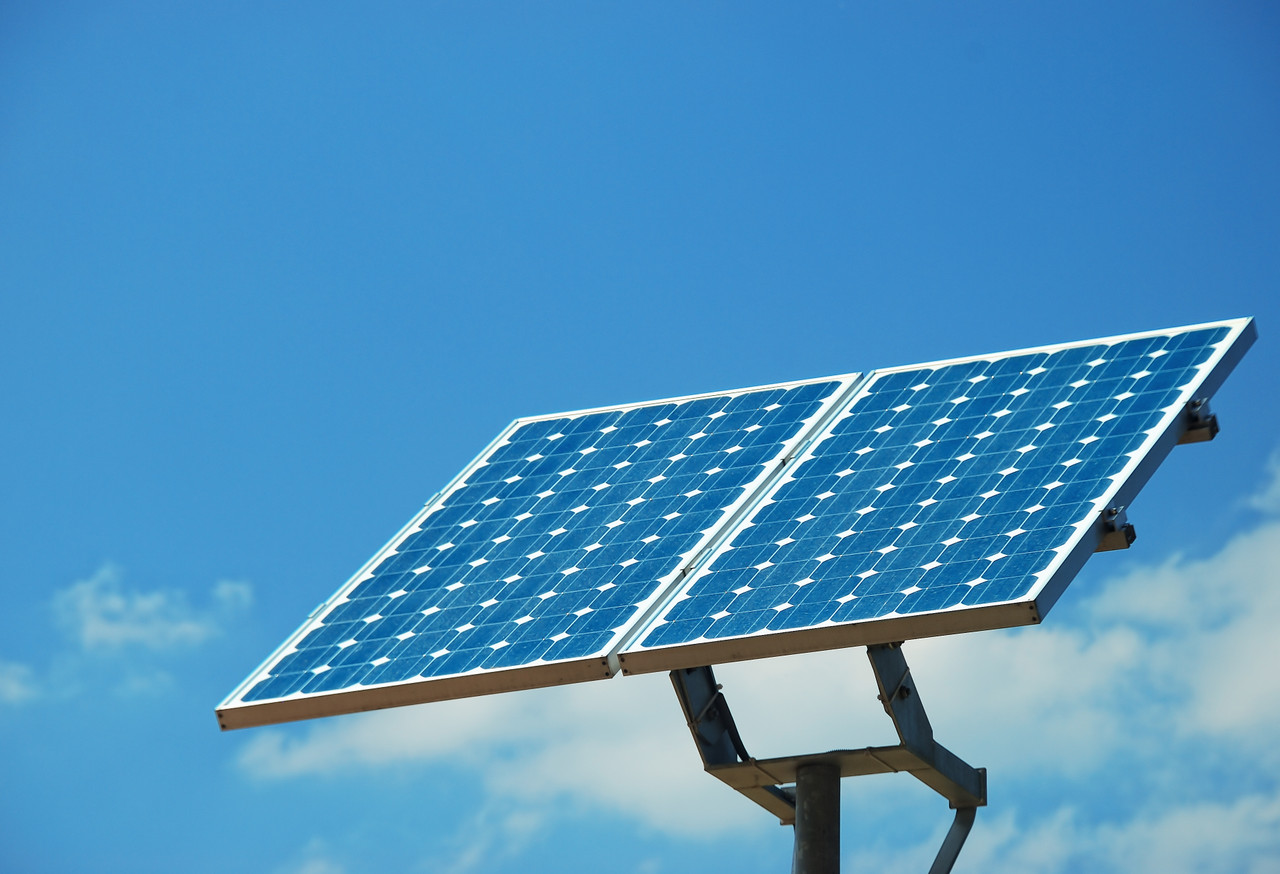What to look for in solar packages
What to keep in mind when shopping for solar kits
If you’re looking to install solar on your van, RV, cabin, or tiny home, solar panel kits are a great way to easily ensure you have a compatible and efficient system. However, it’s important to do your research beforehand to make sure you pick the right solar package for your specific needs.
What is off-grid solar?
Off-grid solar systems, or stand-alone power systems, produce enough energy through the usage of solar panels and battery storage without having to tap into the electric grid. Historically, off-grid systems have been out of reach for many individuals because of the high cost of inverters and batteries. However, prices continue to drop and technologies continue to improve, making it more financially feasible for more people. Portable solar kits work great in off-grid solar systems because you don’t have to worry about connecting to the grid.
Do I need to go off-grid?
Not necessarily. Generating energy from a variety of different sources is a great approach to ensure you have steady access to electricity and take advantage of the economic benefits of solar, while also avoiding the need to install an unnecessarily large and expensive system. Regardless of if you’re in an RV, cabin, or home, it’s often helpful to think of your space as its own mini-grid. When you’re still on-grid, solar energy will be one of a few different energy sources, which could include tapping into the traditional electrical grid if you’re at home or using shore power or a traditional gas powered generator in an RV. All of these sources will feed energy into your home or batteries in your RV, van, or boat.
What are Portable Solar Panel Systems?
Portable solar panel systems give you the ability to generate and store your own electricity using lightweight solar panels, charge controllers, batteries, and inverters. Instead of mounting to the roof, portable solar panels are available in a few different forms, from folding suitcase panel kits that can be set up on the ground to flexible panels that can be hung from your vehicle or other vertical surfaces.
Like roof mounted panels, portable solar panels are made up of many solar cells made of silicon. How do solar panels work? Panels have both a positive and a negative layer, which creates an electric field. When sunlight hits solar panels, they create an electric current. Panels are then connected to a charge controller, which controls how much current goes through a battery. Batteries store and produce DC power. In order to use household AC appliances, such as blenders, laptops, and phone chargers, an inverter is needed to change the power from DC into AC power.
What are the advantages and disadvantages of portable solar systems?
Pros:
- Portable solar systems save you the headache of shopping for compatible components.
- They are a great solution for solar beginners and those on a budget.
Cons:
- Your ability to customize your system is limited because a lot of that work has already been done for you.
- You still have to buy a battery and inverter and ensure those components are compatible.
What about solar generators or stations?
For those with smaller energy needs or if you just need access to back-up power in case of emergencies, solar stations are a great option. Check out Renogy’s Lycan Powerbox. Solar stations eliminate the need to worry about extra inverters, batteries, or wiring. It’s all included in one portable box. Just hook up one of the compatible Renogy solar panels and you’ll be able to access the energy of the sun.
What does a portable solar system cost?
Price can vary based on differences in the specific technology and size of your system. A portable solar system can range from around $400 for the simplest, smallest set-up to upwards of $2,000 for larger installations with higher-quality batteries. Adding additional panels and batteries will also increase that cost.
What’s the difference between monocrystalline and polycrystalline panels?
Renogy offers both monocrystalline and polycrystalline panels. Polycrystalline panels, which are light blue in color, are less efficient than monocrystalline panels, but they are also cheaper. Monocrystalline panels, which are darker in color, are more space-efficient. By taking these factors into consideration, you can choose the best panels based on your budget, energy needs, and space. Learn more about panels in our blog post.
Should I use 12v and 24v panels?
Panels typically come in either 12V and 24V options. Solar panels can be wired in series or in parallel to increase voltage or current, respectively. Most RV’s and boats have 12V battery banks, so people usually stick with the 12V panels in order to be compatible with those. Most panels in Renogy’s solar panel kits are 12V panels. The advantage of using a higher voltage battery bank is that it saves you money in the long run as you need less charge controllers and can use thinner cables for the same amount of power. If your energy needs are over 3KW, go for a 48 volt system. Large off-grid houses often use 48V.
How to Go Solar With a Solar Kit
1. Evaluate your energy needs
You’ll first need to size your system based on your energy needs.
The Renogy Solar Panel Calculator is a great tool that makes it a quick and easy process to help determine your specific needs. The solar sizing calculator allows you to input information about your lifestyle to help you decide on your solar panel requirements. You’ll just need to know what total watts your electronics will consume, how long you plan on running the devices, your charge controller efficiency, and average sun hours per day. The solar panel calculator will then be able to tell you the minimum and recommended system size, as well as the recommended battery output.
Having an accurate understanding of your energy needs will give you a better idea of the costs and ensure you don’t under- or over-build a system.
2. Shop for a DIY solar panel kit
Solar panel kits make it easy to ensure that you have all the parts you need and that they will safely and efficiently work together. Renogy has a range of different solar panel kits for those interested in installing solar on their own.
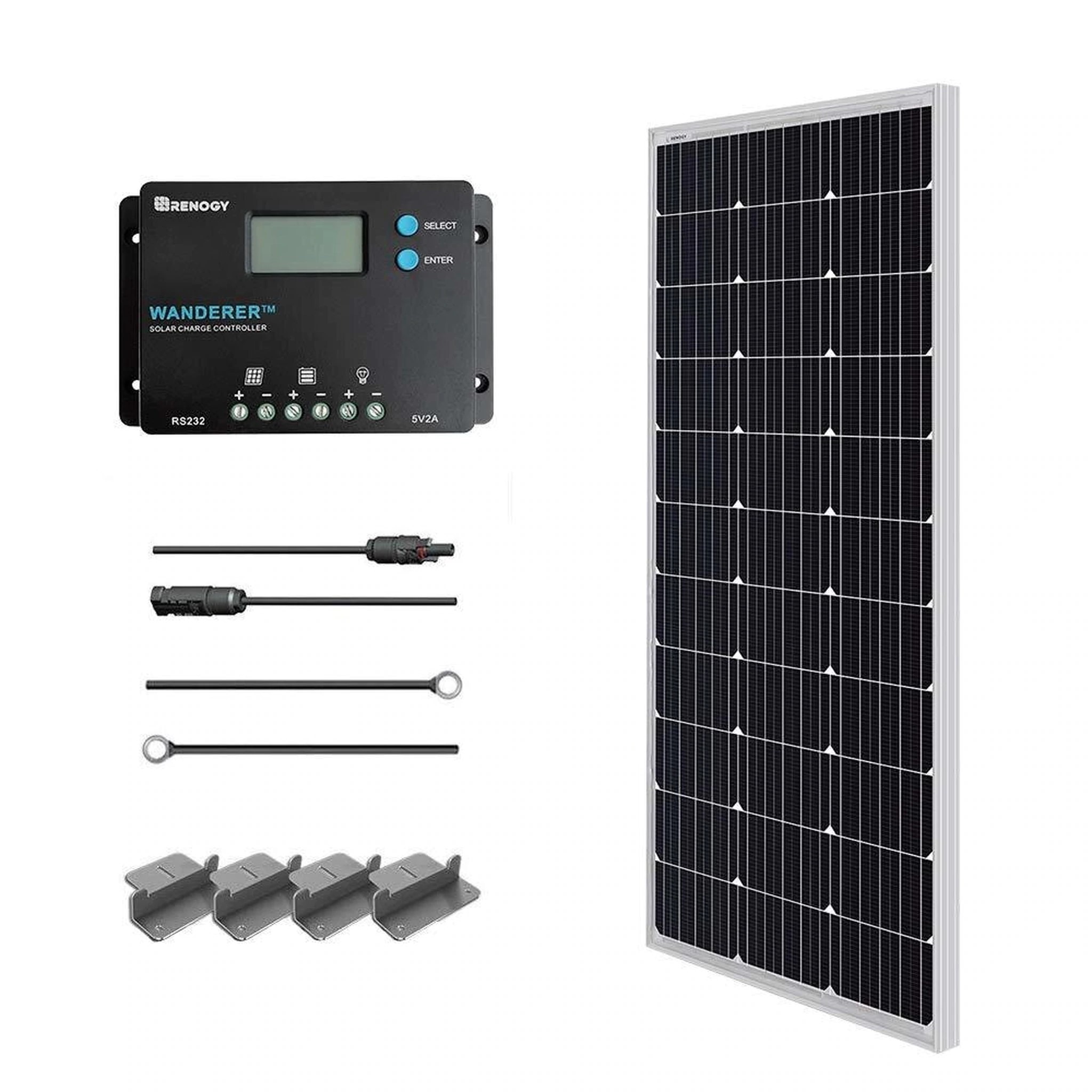
Starter Kits are designed for beginners in mind and are available with easy to handle, small solar panels rated for systems between 50 and 400 watts.
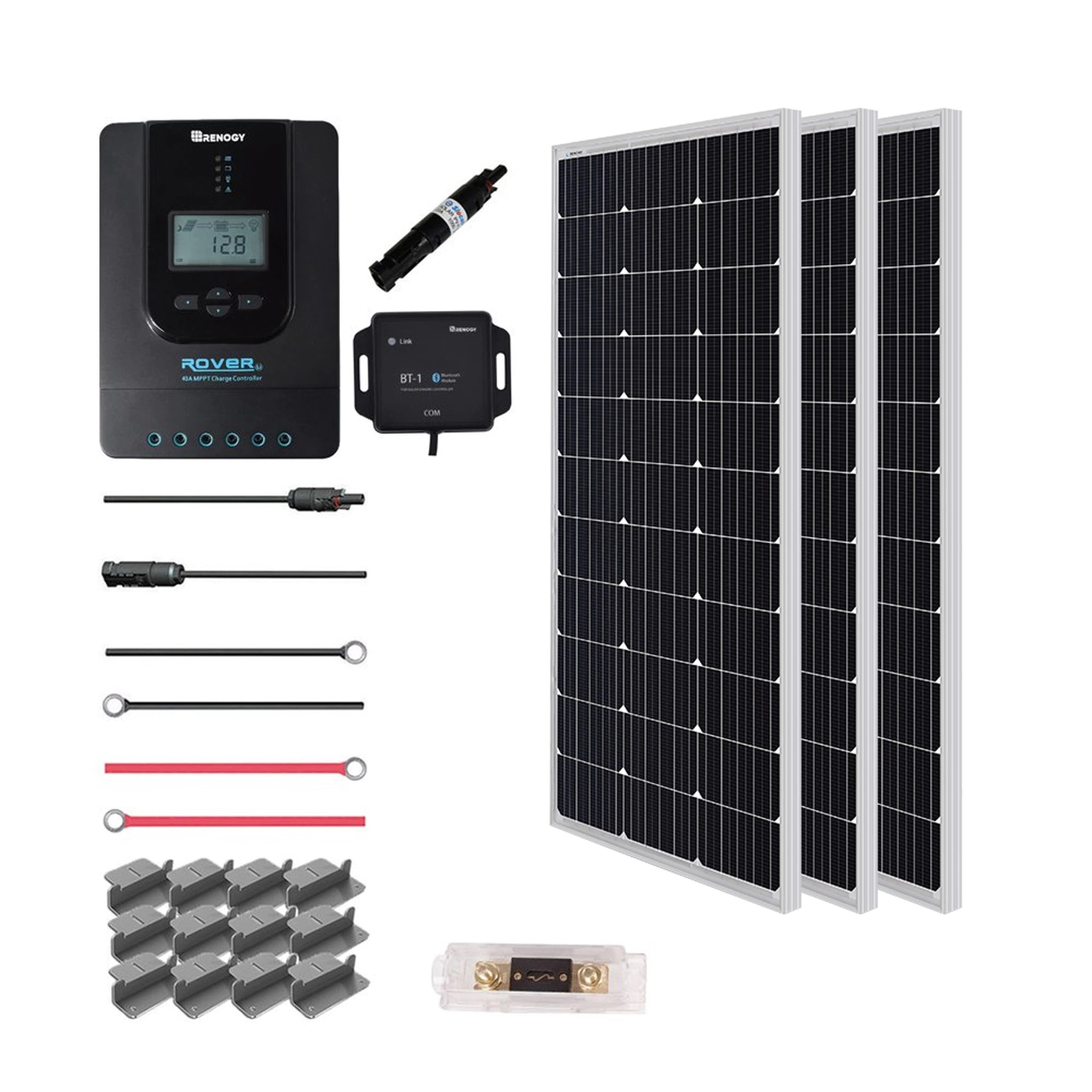
Premium Kits include 100W Eclipse solar panels for systems between 100 and 800 watts.
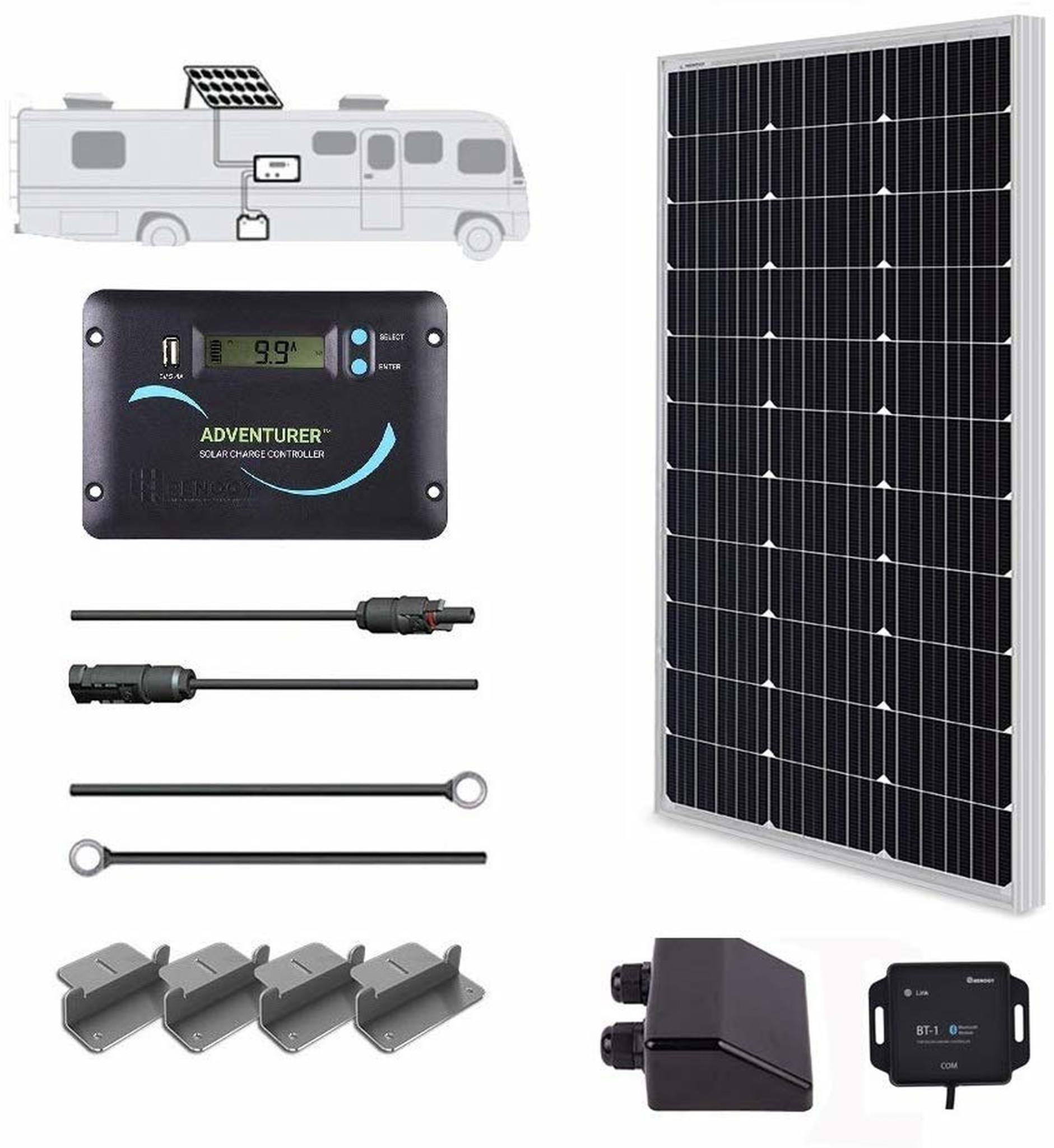
RV/Van Kits are the perfect addition to any RV, motorhome, or mobile application. 100 to 400 watts systems are available, and they also have folding suitcase and flexible solar panel options.
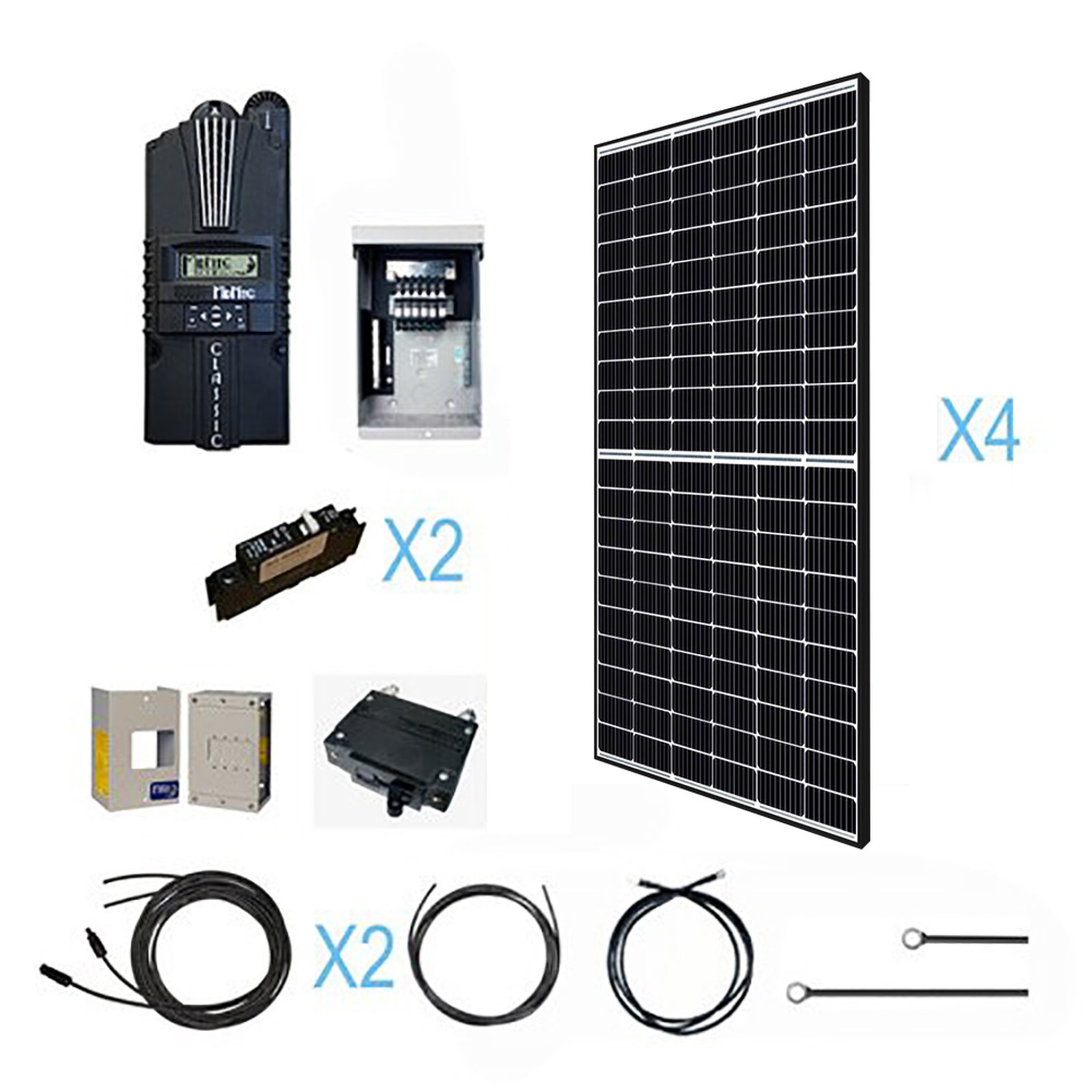
Cabin and Shed Kits are designed for autonomous use away from the grid. These off-grid kits come with everything to power up a cabin, tiny home, or other small scale building. They come in sizes ranging from 1000 watt to 4500 watts.
4. Select Your Batteries
If you’re going off-grid or want to have energy storage in your system, you’ll need to research to decide what battery is best for you. Lead acid batteries are the most inexpensive option and are available at most big-box and auto stores. Absorbed glass matt batteries store 10 to 15 percent more energy than lead acid batteries and charge up to four times faster. Lithium ion batteries are the most expensive options, but also last four times longer than lead-acid batteries and weigh much less. They also require very limited maintenance.
The amount of battery storage you need is based on your energy usage, so refer to your results from the Renogy solar panel calculator. To give you an idea, a battery capacity of 4 to 8 kWh is usually sufficient for an average four-person home. To learn more about batteries, check out our blog post.
5. Permitting and Installation
If you’re installing panels on a cottage, cabin, or home, do your research to see what building codes say and what permitting is required. Every jurisdiction is different. Check with your state energy office, local officials, or a local renewable energy organization to see what requirements exist to make sure you adhere to specific rules, regulations and building codes.
Once all your necessary paperwork is in place (if applicable to you), then it’s time for the actual installation. Renogy’s DIY kits include specifications about how to install the technology, but it never hurts to consult with a professional to ensure the job is done right.
What sort of maintenance do I need to do on my off-grid solar system?
Solar installations are known for being very low maintenance. In the winter, we’d recommend investing in a snow brush for removing snow from the panels (although panels typically generate enough heat to melt off most snow.) In the fall, we’d recommend brushing off any leaves that may collect on the surface of the panels. We’d also encourage you to wash off the panels at least once a year to remove any dirt or other residue that may have collected. Remember if you have your panels mounted on the roof of your RV or van to make sure they are in horizontal orientation and not tilted while you are driving.
Depending on what batteries you end up using for your system, you’ll want to make sure you stay up on the maintenance tasks of your battery bank. If you’re using flooded lead acid batteries, you need to check water levels with a hydrometer and add water to keep them topped off each month. Be sure to keep your terminals clean and check them regularly for corrosion.
We also recommend checking to see what your solar system is outputting at least twice a year to make sure you don’t have any issues in your system. You can use an amp hour meter to check to see if the batteries are fully charged. Charge your batteries fully once a month, in order to equalize the batteries in your bank.
Conclusion
Whether you’re designing an off-grid RV or planning on living a self-sufficient lifestyle in your home, using solar energy can be a great way to save money, be green, and provide steady, reliable power for years.Going solar isn’t as scary or as difficult as it once was thanks to a score of DIY kits available in the marketplace. If you are interested in going off-grid or living a mobile lifestyle in a van or RV, and have the time and energy to dedicate toward a solar project, a solar kit can be a great way to meet your energy needs and save money.

